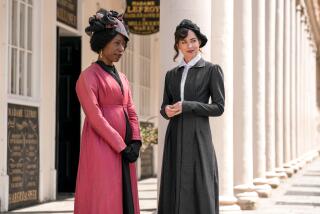Austen Powers
- Share via
“The 18th century was an age such as our imagination can barely comprehend,” Elizabeth Jenkins observed in her biography of Jane Austen. In the 60 years that have passed since she did so, that graceful age has slipped further beyond our reach, so used has our vision become to gimcrack building and hideous graffiti, so beggared our perceptions by the assault of a coarsened fashion, so confused our tastes by the fraudulent in art and literature and music. “Weltering as we do in a slough of habitual ugliness,” Jenkins went on, “ . . . we catch sight every now and again of a house-front, plain and graceful, with a fanlight like the half of a spider’s web and a slip of iron balcony; among the florid or stark disfigurements of a graveyard we discover a tombstone with elegant letters composing, in a single sentence, a well-turned epitaph.”
Squares and crescents and terraces are still teasingly a world; perfectly preserved, the fiction that peoples it is at its richest and most subtle in the six masterpieces of a plain young woman who observed and listened as perceptively as she recorded. The selective eye and the heightened sense of pattern that combine to create the visual marvels of the 18th century combine again in Jane Austen’s novels. They are as skillfully deployed, inspiring invention, dictating economy. Yet it would be erroneous to believe that elegance in architecture and prose calmed the turbulence of everyday life or dismissed vulgarity. Beneath the surface polish there was a squalor as cruel and as ugly as anything we are familiar with today. Hooligan apprentices marauded, sharp practice and crudity thrived.
The difference is that the Georgians so valued appearances--and manners and style--that their valuation became the very heart of the age. Behind the scenes that make Jane Austen famous there is an army of unnamed servants, vast piles of odorous finery waiting to be washed, the filth of city streets, the mud that keeps ladies indoors at their drawing and their pianos all winter long. It was the bustling, outraged Charles Dickens who gave the servants their roles again, who made heroes of blacksmiths and clerks and may have wondered if the stuff of life really was a single man in possession of a good fortune being in want of a wife.
Dickens was 5 when Jane Austen died in 1817; Charlotte Bronte was 1 and neither Emily nor Anne had yet been born. The king for whose health and happiness Jane had prayed on her knees every Sunday--and who needed all the prayers he could get--was George III. When his reign ended, in 1820, Georgian England was already slipping away. Symmetry mattered less than decoration, simplicity less than fussy declarations of wealth. As if in compensation, the great age of the English novel was already an infant promise.
Forty-five years earlier, when Jane Austen was born, her father was the rector of Steventon in Hampshire. She was the last of the Austens’ six children, four of whom were boys. It was a lively household, only saddened by the necessary absence from it of one of Jane’s brothers, who suffered from so severe a form of epilepsy that he could not be looked after at home. Cassandra and Jane were dutiful rectory daughters, domesticated and busy, visiting the poor and the sick among their father’s parishioners, daily improving their artistic skills. It was also a household in which books were read for pleasure, novels and stories in particular. According to her brother Henry, Jane’s “favourite moral writers” were Dr. Johnson and William Cowper; among novelists, she delighted in Fanny Burney and preferred Richardson to Fielding, whom she found too boisterous.
Out of the faithful throng of readers who keep literature alive there emerges from time to time one whose imagination is so stirred, becomes so restless, that books written by other people are no longer enough. In the rectory at Steventon, scribbling began--later to be revised at Chawton. As if some relief were sought from the fading Georgian world of understatement and reason, the Gothic was in fashion--tales of craggy mountainsides and graves and ruins, of wild passion and terrible secrets. “Northanger Abbey” is the Austen comment on this high-flown genre; a novel born--possibly--of dissatisfaction with early attempts to produce “Sense and Sensibility” and “Pride and Prejudice.”
The latter began as “First Impressions.” Even as a young girl, Jane Austen was instinctively aware of the value of allowing time to decide for her the merit of what she had written: “First Impressions” was mulled over for 15 years, lived with, thought about, finally rewritten to become “Pride and Prejudice.” In November 1797, the Rev. George Austen, having just read “First Impressions,” wrote to a publisher called Cadell: “I have in my possession a manuscript novel, comprising 3 vols, about the length of Miss Burney’s ‘Evelina’ . . . Should you give any encouragement, I will send you the work.” No encouragement was forthcoming, even though Mr. Austen would have paid for publication. Instead, the three volumes stayed where they were, in a rectory drawer, and Cadell’s loss was English literature’s gain. For as time distanced their author from her carefully composed pages, she came to realize, as patient novelists so often do, that what she had created was the raw material of a novel rather than the finished thing. There is the flavor of hard-wrought perfection about “Pride and Prejudice,” yet nowhere a hint of the long haul that turned a prodigy’s talent into art. “First Impressions” has the ring of what nowadays would be called a working title. “Pride and Prejudice,” borrowed from Burney and more tellingly employed, is stylish and exact: The novel could be nothing else.
Popular dramatizations for film, television or the stage recreate the story as a sentimental journey from its first famous sentence to the general clamor of wedding bells. The Bennet sisters simper their way though a plot rendered slapdash in a search for wider appeal. As often as not, Mrs. Bennet becomes a winking imbecile, Darcy a novelette’s glamor boy. A period approximation is usually what is offered, but if Jane Austen is not to suffer a vast injustice, the approximate won’t do: the removal of detail takes from the novel its vigor, its light and shade, and the intricacies without which the whole construction collapses. The achievement that is locked mysteriously within any great work of art--and what exactly it is that gives such a work its potency--remains its own secret. “Pride and Prejudice” cannot safely be tampered with.
The prejudice belongs for the most part to Elizabeth Bennet, the pride is Fitzwilliam Darcy’s. Elizabeth is the second daughter in a family of daughters and while it is often suggested that she and her older sister, Jane, are drawn directly from the sisters of the rectory, it is more likely that Elizabeth is probably the wisest young heroine in fiction. Still in her early 20s, she knows and understands the ways of the world, offers advice to her father when he is in need of it, wishes her garrulous mother would calm down and puts that alarming termagant, Lady Catherine de Bourgh, in her place. She rejects the marriage proposal of the obsequious Mr. Collins, unaffected by the knowledge that her acceptance would rescue the Bennets from the pecuniary uncertainty that threatens their future (their property being entailed in Collins’ name). When the detestable Darcy proclaims his love, she uses the opportunity, since emotions are being bared, to explain to him why it is she so heartily dislikes him.
It is this vibrant voice that echoes in the pages of the novel, that lends tension to its plot and color to its characters. Seen through the eyes of Elizabeth’s eyes, Mr. Bennet’s laconic sharpness is softened, her younger sisters’ silliness intensified, Lady Catherine revealed to be--in spite of her breeding--ill-bred. Collins is all the funnier when Elizabeth winkles out new absurdities in him, Darcy more arrogant, more outrageous in his apparent vanity when Elizabeth--whose opinion it is insisted we respect--observes him to be so. For Elizabeth, more than for anyone else, he increasingly becomes a figure of sinister fascination.
For his part, Darcy readily admits that he is not without defect. “I have faults enough, but they are not, I hope, of understanding. My temper I dare not vouch for.--It is I believe too little yielding--certainly too little for the convenience of the world. I cannot forget the follies and vices of others so soon as I ought, nor their offences against myself. My feelings are not puffed about with every attempt to move them. My temper would perhaps be called resentful.--My good opinion once lost is lost for ever.”
What annoys Elizabeth most about Darcy is that she cannot laugh at him. She “dearly loves a laugh,” but Darcy stops just short of being ridiculous. When they dance together there are silences, and it perhaps irritates Elizabeth further that she is as responsible for these as he is. Though she says so archly, it is nonetheless an honest admission when she confesses that she has noticed a similarity in the turn of their minds. “We are each of an unsocial, taciturn disposition, unwilling to speak, unless we expect to say something that will amaze the whole room, and be handed down to posterity with all the eclat of proverb.”
Darcy politely agrees that, if she says so, he must accept this view of himself but denies that it could be applied to her, and another silence stiflingly begins. Later, when Darcy’s more heinous sins are exposed, they neatly match the character of a man too well remembered for dancing only four dances in a whole evening, although “more than one young lady was sitting down in want of a partner.” Such gross behavior has already warned the watchful.
When Darcy’s easygoing friend Bingley is attracted by Jane Bennet, Darcy advises caution. Her father, witty and sensible, is indeed a gentleman, but who could bear Mrs. Bennet as a mother-in-law? That side of the family is deep in trade, and does it not seem to Bingley that Jane reciprocates his feelings less warmly than she might? Could it possibly be that his fortune and the great house he has rented at Netherfield constitute his attraction? And how tiresome her younger sisters are!
When the handsome Wickham arrives on the scene, the tales he brings with him about Darcy complete the ugly picture, and the time is ripe for Darcy to propose.
“In a hurried manner he immediately began an enquiry after her health, imputing his visit to a wish of hearing that she were better. She answered him with cold civility. He sat down for a few moments, and then getting up walked about the room. Elizabeth was surprised, but said not a word. After silence of several minutes he came towards her in an agitated manner, and thus began,
“ ‘In vain have I struggled. It will not do. My feelings will not be repressed. You must allow me to tell you how ardently I admire and love you.’ ”
“Pride and Prejudice” relies on a straightforward narrative that has all to do with marriage and money. Seeking suitable wives, the officers of this regiment or that are themselves pursued by girls of good family. Big-house dancing, card-playing and the occasional afternoon walk supply the opportunities for mutual examination before choices are made. But there is also, and more essential to the success of the novel, the upsetting of what seems to be.
The charm of Wickham deludes. Lady Catherine is a woman in disguise. The social awkwardness he shares with his sister is what Darcy’s outspoken manner covers over. In almost every regard, Elizabeth was wrong about him--errors that later reveal her too-certain tone to be agreeably less smug than it has occasionally seemed. Nor is the theme of superficial impressions confined to an examination of character: Beneath the artful flow of comedy, fed by some of the funniest writing in the English language, there is a deeper, thorny unease. Can the bliss of wedded life be taken for granted? Does marriage always deliver the fruit of its expectations?
The union of the ill-paired Mr. and Mrs. Bennet has been a disappointment for her and a bitter disaster for him. A pretty girl has become a silly woman; a gracious young man is ineffectual in his middle age. Has Elizabeth’s closest friend let herself in for a ghastly future by settling for Collins’ rectory? Is it entirely unlikely that Lydia, deceived by an adventurer, will end on the streets? When at last she marries Bingley, Jane takes on his very disagreeable sisters.
It is as if the Georgian artifact is specious after all, as if it cannot properly sustain its place in the scheme of things, as if the squalor to be found in less protected lives has broken through in a different form. Although she herself seems to have been the child of a contentedly united couple, Jane Austen was well aware that marriage could be a brutal trap. To this day her views on the subject shock those who idealize her: “Mrs. Hall of Sherborne was brought to bed yesterday of a dead child, some weeks before she expected, owing to a fright. I suppose she happened unawares to look at her husband.” Glancing across a room, the unfortunate young wife saw for the first time the man she had years ago married: with speculation as biting in real life as it is on the page, a truth is recorded, and truth is what matters.
Freed from the entanglements of pretense and deceit, it floats naturally to the surface in the novel that is probably Austen’s most accomplished. Its dogged pursuit allows the gentle twist of her conclusion, for it was purely the truth that Darcy told when he alerted his friend to the shortcomings of the family into which they both later married, and Elizabeth’s common sense cannot deny it. Her wisdom is shown to have been suspect in her early assessment of the man she resented loving; young wisdom often is. His descent from his artificial heights is no pretense; his decency is proved by his actions.
In such ways the ground is well cleared before the two marry. They understand one another through their flaws, recognize in one another good and bad, are aware of where their differences lie and how their similarities match: Vague expectations have no place in any of it. Their marriage is marriage’s redemption: Laughter there will be, and not only Darcy subjected to it.
More to Read
Sign up for our Book Club newsletter
Get the latest news, events and more from the Los Angeles Times Book Club, and help us get L.A. reading and talking.
You may occasionally receive promotional content from the Los Angeles Times.










